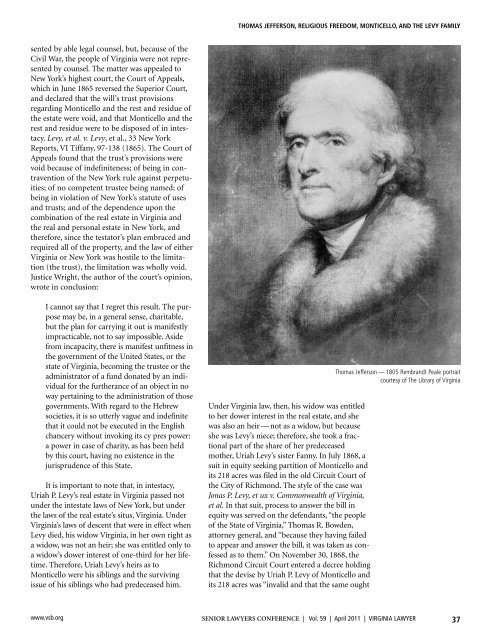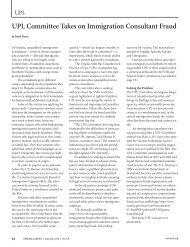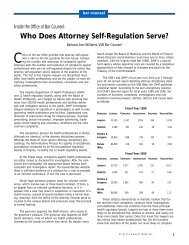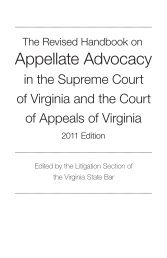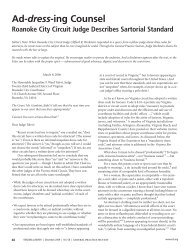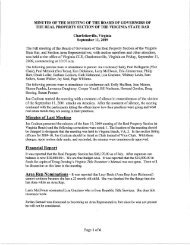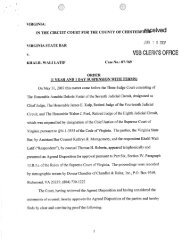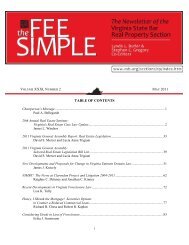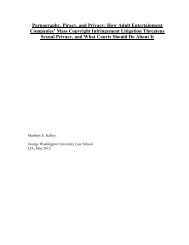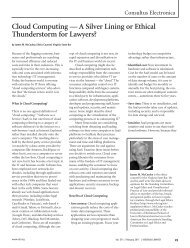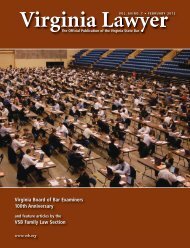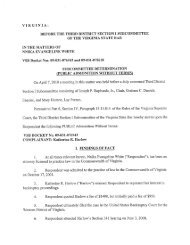Thomas Jefferson, Religious Freedom ... - Virginia State Bar
Thomas Jefferson, Religious Freedom ... - Virginia State Bar
Thomas Jefferson, Religious Freedom ... - Virginia State Bar
You also want an ePaper? Increase the reach of your titles
YUMPU automatically turns print PDFs into web optimized ePapers that Google loves.
sented by able legal counsel, but, because of the<br />
Civil War, the people of <strong>Virginia</strong> were not represented<br />
by counsel. The matter was appealed to<br />
New York’s highest court, the Court of Appeals,<br />
which in June 1865 reversed the Superior Court,<br />
and declared that the will’s trust provisions<br />
regarding Monticello and the rest and residue of<br />
the estate were void, and that Monticello and the<br />
rest and residue were to be disposed of in intestacy.<br />
Levy, et al. v. Levy, et al., 33 New York<br />
Reports, VI Tiffany, 97-138 (1865). The Court of<br />
Appeals found that the trust’s provisions were<br />
void because of indefiniteness; of being in contravention<br />
of the New York rule against perpetuities;<br />
of no competent trustee being named; of<br />
being in violation of New York’s statute of uses<br />
and trusts; and of the dependence upon the<br />
combination of the real estate in <strong>Virginia</strong> and<br />
the real and personal estate in New York, and<br />
therefore, since the testator’s plan embraced and<br />
required all of the property, and the law of either<br />
<strong>Virginia</strong> or New York was hostile to the limitation<br />
(the trust), the limitation was wholly void.<br />
Justice Wright, the author of the court’s opinion,<br />
wrote in conclusion:<br />
I cannot say that I regret this result. The purpose<br />
may be, in a general sense, charitable,<br />
but the plan for carrying it out is manifestly<br />
impracticable, not to say impossible. Aside<br />
from incapacity, there is manifest unfitness in<br />
the government of the United <strong>State</strong>s, or the<br />
state of <strong>Virginia</strong>, becoming the trustee or the<br />
administrator of a fund donated by an individual<br />
for the furtherance of an object in no<br />
way pertaining to the administration of those<br />
governments. With regard to the Hebrew<br />
societies, it is so utterly vague and indefinite<br />
that it could not be executed in the English<br />
chancery without invoking its cy pres power:<br />
a power in case of charity, as has been held<br />
by this court, having no existence in the<br />
jurisprudence of this <strong>State</strong>.<br />
It is important to note that, in intestacy,<br />
Uriah P. Levy’s real estate in <strong>Virginia</strong> passed not<br />
under the intestate laws of New York, but under<br />
the laws of the real estate’s situs, <strong>Virginia</strong>. Under<br />
<strong>Virginia</strong>’s laws of descent that were in effect when<br />
Levy died, his widow <strong>Virginia</strong>, in her own right as<br />
a widow, was not an heir; she was entitled only to<br />
a widow’s dower interest of one-third for her lifetime.<br />
Therefore, Uriah Levy’s heirs as to<br />
Monticello were his siblings and the surviving<br />
issue of his siblings who had predeceased him.<br />
www.vsb.org<br />
THOMAS JEFFERSON, RELIGIOUS FREEDOM, MONTICELLO, AND THE LEVY FAMILY<br />
Under <strong>Virginia</strong> law, then, his widow was entitled<br />
to her dower interest in the real estate, and she<br />
was also an heir — not as a widow, but because<br />
she was Levy’s niece; therefore, she took a fractional<br />
part of the share of her predeceased<br />
mother, Uriah Levy’s sister Fanny. In July 1868, a<br />
suit in equity seeking partition of Monticello and<br />
its 218 acres was filed in the old Circuit Court of<br />
the City of Richmond. The style of the case was<br />
Jonas P. Levy, et ux v. Commonwealth of <strong>Virginia</strong>,<br />
et al. In that suit, process to answer the bill in<br />
equity was served on the defendants, “the people<br />
of the <strong>State</strong> of <strong>Virginia</strong>,” <strong>Thomas</strong> R. Bowden,<br />
attorney general, and “because they having failed<br />
to appear and answer the bill, it was taken as confessed<br />
as to them.” On November 30, 1868, the<br />
Richmond Circuit Court entered a decree holding<br />
that the devise by Uriah P. Levy of Monticello and<br />
its 218 acres was “invalid and that the same ought<br />
<strong>Thomas</strong> <strong>Jefferson</strong> — 1805 Rembrandt Peale portrait<br />
courtesy of The Library of <strong>Virginia</strong><br />
SENIOR LAWYERS CONFERENCE | Vol. 59 | April 2011 | VIRGINIA LAWYER 37


